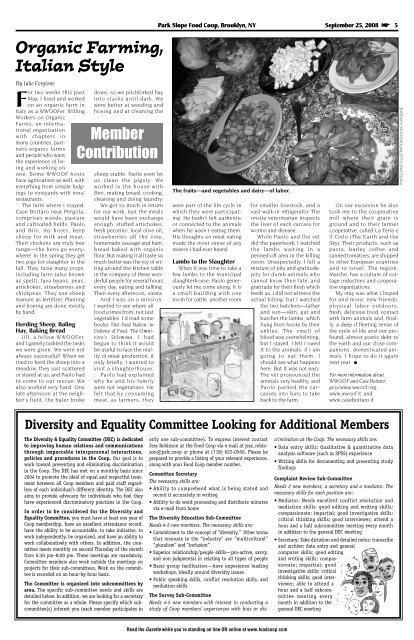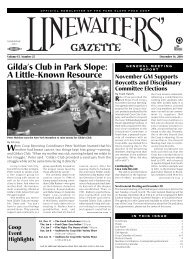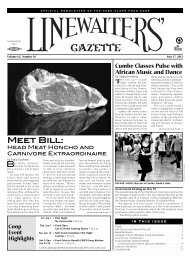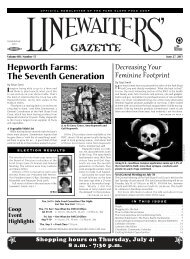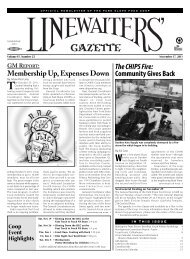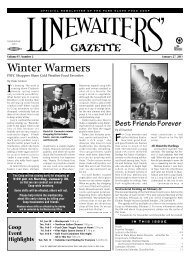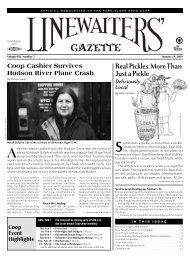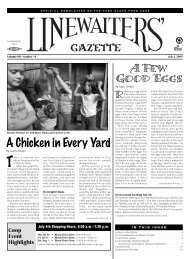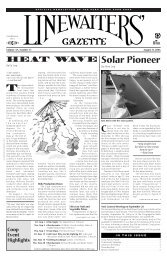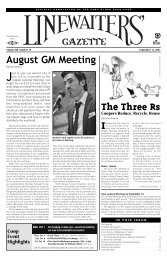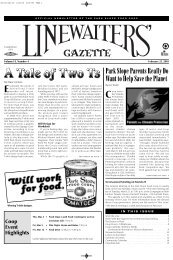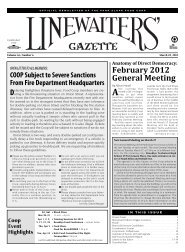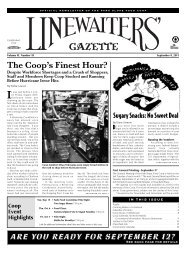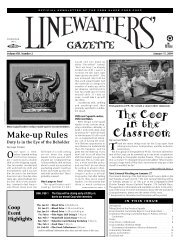September 25th, 2008 : Volume CC, Number 20 - Park Slope Food ...
September 25th, 2008 : Volume CC, Number 20 - Park Slope Food ...
September 25th, 2008 : Volume CC, Number 20 - Park Slope Food ...
You also want an ePaper? Increase the reach of your titles
YUMPU automatically turns print PDFs into web optimized ePapers that Google loves.
Organic Farming,<br />
Italian Style<br />
By Julie Forgione<br />
For two weeks this past<br />
May, I lived and worked<br />
on an organic farm in<br />
Italy as a WWOOFer. Willing<br />
Workers on Organic<br />
Farms, an international<br />
organization<br />
with chapters in<br />
many countries, partners<br />
organic farms<br />
and people who want<br />
the experience of living<br />
and working on<br />
one. Some WWOOF hosts<br />
have agritourism as well, with<br />
everything from simple lodgings<br />
to vineyards with inns/<br />
restaurants.<br />
The farm where I stayed,<br />
Case Bottaro near Pergola,<br />
comprises woods, pasture<br />
and cultivated fields. Paolo<br />
and Bini, my hosts, keep<br />
sheep for milk and meat.<br />
Their chickens are truly free<br />
range—the hens go everywhere!<br />
In the spring they get<br />
two pigs for slaughter in the<br />
fall. They raise many crops,<br />
including farro (also known<br />
as spelt), fava beans, peas,<br />
artichokes, strawberries and<br />
chickpeas. They use sheep<br />
manure as fertilizer. Planting<br />
and hoeing are done mostly<br />
by hand.<br />
Herding Sheep, Baling<br />
Hay, Baking Bread<br />
Jill, a fellow WWOOFer,<br />
and I gamely tackled the tasks<br />
we were given. We were not<br />
always successful! When we<br />
tried to herd the sheep into a<br />
meadow, they just scattered<br />
or stared at us, and Paolo had<br />
to come to our rescue. We<br />
also worked very hard. One<br />
late afternoon at the neighbor’s<br />
field, the baler broke<br />
down, so we pitchforked hay<br />
into stacks until dark. We<br />
were better at weeding and<br />
hoeing and at cleaning the<br />
Member<br />
Contribution<br />
sheep stable. Paolo even let<br />
us clean the pigsty. We<br />
worked in the house with<br />
Bini, making bread, cooking,<br />
cleaning and doing laundry.<br />
We got so much in return<br />
for our work. Just the meals<br />
would have been exchange<br />
enough: stuffed artichokes,<br />
fresh pecorino, local olive oil,<br />
strawberries off the vine,<br />
homemade sausage and ham,<br />
bread baked with organic<br />
flour. But making it all taste so<br />
much better was the joy of sitting<br />
around the kitchen table<br />
in the company of these wonderful<br />
people for several hours<br />
every day, eating and talking.<br />
Then every afternoon, siesta.<br />
And I was on a mission:<br />
I wanted to see where all<br />
food comes from, not just<br />
vegetables. I’d read some<br />
books: Fast <strong>Food</strong> Nation, In<br />
Defense of <strong>Food</strong>, The Omnivore’s<br />
Dilemma. I had<br />
begun to think it would<br />
be useful to face the reality<br />
of meat production, if<br />
only briefly. I wanted to<br />
visit a slaughterhouse.<br />
Paolo had explained<br />
why he and his family<br />
were not vegetarians. He<br />
felt that by consuming<br />
meat, as farmers, they<br />
<strong>Park</strong> <strong>Slope</strong> <strong>Food</strong> Coop, Brooklyn, NY <strong>September</strong> 25, <strong><strong>20</strong>08</strong> 5<br />
The fruits—and vegetables and dairy—of labor.<br />
were part of the life cycle in<br />
which they were participating.<br />
He hadn’t felt authentic<br />
or connected to the animals<br />
when he wasn’t eating them.<br />
His thoughts on meat eating<br />
made the most sense of any<br />
reason I had ever heard.<br />
Lambs to the Slaughter<br />
When it was time to take a<br />
few lambs to the municipal<br />
slaughterhouse, Paolo generously<br />
let me come along. It is<br />
a small building with one<br />
room for cattle, another room<br />
for smaller livestock, and a<br />
vast walk-in refrigerator. The<br />
onsite veterinarian inspects<br />
the liver of each carcass for<br />
worms and disease.<br />
While Paolo and the vet<br />
did the paperwork, I watched<br />
the lambs waiting in a<br />
penned-off area in the killing<br />
room. Unexpectedly, I felt a<br />
mixture of pity and gratitude:<br />
pity for dumb animals who<br />
cannot know their fate, and<br />
gratitude for their flesh which<br />
feeds us. I did not witness the<br />
actual killing, but I watched<br />
the two butchers—father<br />
and son—skin, gut and<br />
butcher the lambs, which<br />
hung from hooks by their<br />
ankles. The smell of<br />
blood was overwhelming,<br />
but I stayed. I felt I owed<br />
it to the animals: if I am<br />
going to eat them, I<br />
should see what happens<br />
here. But it was not easy.<br />
The vet pronounced the<br />
animals very healthy, and<br />
Paolo packed the carcasses<br />
into bins to take<br />
back to the farm.<br />
On our excursion he also<br />
took me to the cooperative<br />
mill where their grain is<br />
ground and to their farmer<br />
cooperative, called La Terra e<br />
il Cielo (The Earth and the<br />
Sky). Their products, such as<br />
pasta, barley coffee and<br />
canned tomatoes, are shipped<br />
to other European countries<br />
and to Israel. The region,<br />
Marche, has a culture of cottage<br />
industries and cooperative<br />
organizations.<br />
My stay was what I hoped<br />
for and more: new friends;<br />
physical labor outdoors,<br />
fresh, delicious food, contact<br />
with farm animals and, finally,<br />
a deep if fleeting sense of<br />
the cycle of life and our profound,<br />
almost poetic debt to<br />
the earth and our close companions,<br />
domesticated animals.<br />
I hope to do it again<br />
next year. ■<br />
For more information about<br />
WWOOF and Case Bottaro,<br />
go to www.wwoof.org,<br />
www.wwoof.it and<br />
www.casebottaro.it<br />
PHOTO AND ILLUSTRATION BY JULIE FORGIONE<br />
Diversity and Equality Committee Looking for Additional Members<br />
The Diversity & Equality Committee (DEC) is dedicated<br />
to improving human relations and communications<br />
through impeccable interpersonal interactions,<br />
policies and procedures in the Coop. Our goal is to<br />
work toward preventing and eliminating discrimination<br />
in the Coop. The DEC has met on a monthly basis since<br />
<strong>20</strong>04 to promote the ideal of equal and respectful treatment<br />
between all Coop members and paid staff regardless<br />
of each individual’s different identity. The DEC also<br />
aims to provide advocacy for individuals who feel they<br />
have experienced discriminatory practices in the Coop.<br />
In order to be considered for the Diversity and<br />
Equality Committee, you must have at least one year of<br />
Coop membership, have an excellent attendance record,<br />
have the ability to be accountable, to take initiative, to<br />
work independently, be organized, and have an ability to<br />
work collaboratively with others. In addition, the committee<br />
meets monthly on second Thursday of the month<br />
from 6:30 pm–8:00 pm. These meetings are mandatory.<br />
Committee members also work outside the meetings on<br />
projects for their sub-committees. Work on the committee<br />
is recorded on an hour-by-hour basis.<br />
The Committee is organized into subcommittees by<br />
area. The specific sub-committee needs and skills are<br />
detailed below. In addition, we are looking for a secretary<br />
for the committee as a whole. Please specify which subcommittee(s)<br />
interest you (each member participates in<br />
only one sub-committee). To express interest contact<br />
Jess Robinson at the <strong>Food</strong> Coop via e-mail at jess_robinson@psfc.coop<br />
or phone at (718) 622-0560. Please be<br />
prepared to provide a listing of your relevant experience,<br />
along with your <strong>Food</strong> Coop member number.<br />
Committee Secretary<br />
The necessary skills are:<br />
• Ability to comprehend what is being stated and<br />
record it accurately in writing<br />
• Ability to do word processing and distribute minutes<br />
via e-mail from home<br />
The Diversity Education Sub-Committee<br />
Needs 4-5 new members. The necessary skills are:<br />
• Commitment to the concept of “diversity.” Other terms<br />
that resonate in the “industry” are “multicultural”<br />
“pluralism” and “inclusion”<br />
• Superior relationship/people skills—pro-active, savvy,<br />
and non-judgmental in relating to all types of people<br />
• Basic group facilitation—have experience leading<br />
workshops, ideally around diversity issues<br />
• Public speaking skills, conflict resolution skills, and<br />
mediation skills<br />
The Survey Sub-Committee<br />
Needs 4-5 new members with interest in conducting a<br />
study of Coop members’ experiences with bias or discrimination<br />
at the Coop. The necessary skills are:<br />
• Data entry skills: Qualitative & quantitative data<br />
analysis software (such as SPSS) experience<br />
• Writing skills for documenting and presenting study<br />
findings<br />
Complaint Review Sub-Committee<br />
Needs 2 new members, a secretary and a mediator. The<br />
necessary skills for each position are:<br />
• Mediator: Needs excellent conflict resolution and<br />
mediation skills; good editing and writing skills;<br />
compassionate; impartial; good investigative skills;<br />
critical thinking skills; good interviewer; attend a<br />
hour and a half subcommittee meeting every month<br />
in addition to the general DEC meeting<br />
• Secretary: Take dictation and detailed notes; transcribe<br />
and archive; data entry and general<br />
computer skills; good editing<br />
and writing skills; compassionate;<br />
impartial; good<br />
investigative skills; critical<br />
thinking skills; good interviewer;<br />
able to attend a<br />
hour and a half subcommittee<br />
meeting every<br />
month in addition to the<br />
general DEC meeting<br />
Read the Gazette while you’re standing on line OR online at www.foodcoop.com


